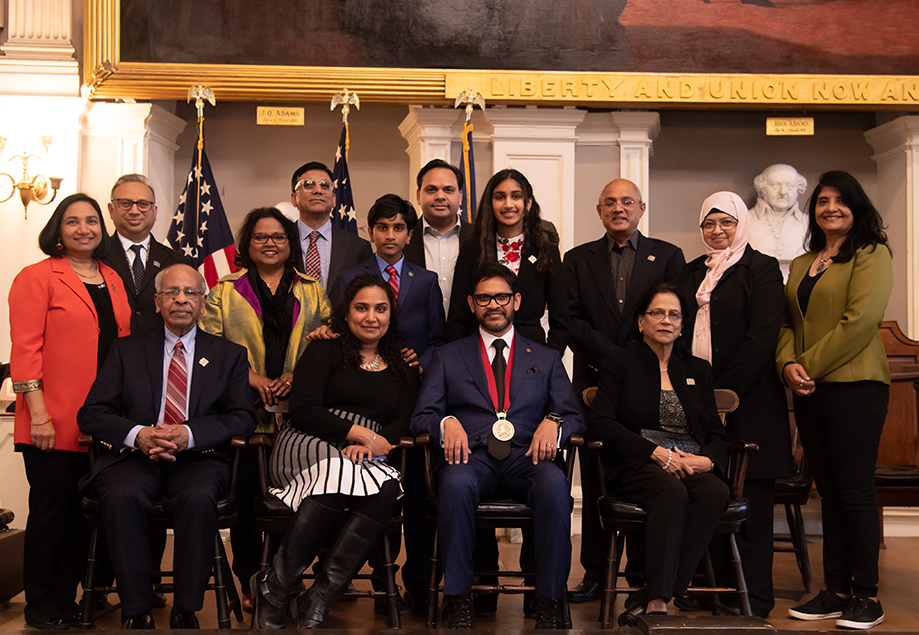Mahesh Daas Named Boston Architectural College’s Eighth President

Date Posted
June 19, 2019
For More Info
Categories
NewsAnnouncementBAC in the NewsPresident's Blog
Source
Nancy Finn
The Boston Architectural College's Board of Trustees has named Mahesh Daas, M. Arch, Ed.D., as the College's eighth president, effective July 12, 2019. He will succeed Glen LeRoy, FAIA, FAICP, who announced he would be retiring at the end of this academic year.
Mahesh Daas is a designer, a technologist with expertise in robotics, and an experienced academic leader who chronicled the presidential leadership of former MIT president Charles M. Vest. His career spans 23 years at four universities including 14 years in higher education leadership roles. Most recently, he served as dean of the School of Architecture and Design at the University of Kansas, Lawrence.
In 2011, Daas was elevated as an Association of Collegiate Schools of Architecture Distinguished Professor, the highest national recognition for an architectural educator. He was recognized for contributions to design computing with the 2013 Association for Computer Aided Design in Architecture (ACADIA) Society Award of Excellence. ACADIA elected him twice as its president and he served on the editorial board of the International Journal of Architectural Computing and currently serves on the editorial board of Construction Robotics Journal.
"Mahesh is a visionary leader who has a proven track record of success," said Richard Martini, B. Arch. '84, BAC Board of Trustees Chair. "His experience and entrepreneurial vision uniquely align with the College's needs today and our vision for the future. We are very excited to welcome him to the BAC community, where he will guide the College into the 21st century," he said.
"I am honored to be chosen as the next BAC president, and to further propel our proven practice-based education of the designers, developers, and builders of the world's built environment," President-elect Daas said. "My life and educational experiences as a first-generation student and first-generation immigrant resonate with the experiences of many of the BAC's students. Through our collective teamwork, I am confident we will continue the strong vision of building upon the strengths of this venerable institution. My goal is to continue the path of promoting creativity, diversity, and inclusiveness within all of the design professions. The BAC is, and has always been, a beacon for innovation-for all of our students, our alumni, our faculty and staff, and all of the communities we positively impact," he said.
Daas earned a bachelor's degree in architecture from Jawaharlal Nehru Technological University, Hyderabad, India; a master's degree in urban design from Kansas State University; and an executive doctorate in higher education management from the University of Pennsylvania. Daas is also the author of Leading with Aesthetics: The Transformational Leadership of President Charles M. Vest at M.I.T. (Lexington Books, 2015 & 2019) and Towards a Robotic Architecture (Oro Editions 2018).
The 12-person BAC Presidential Search Committee included representatives from the faculty, student body, Alumni Council, and Board of Trustees, and was led by Judith Nitsch, Board of Trustees vice chair and founding principal of Nitsch Engineering.
According to Nitsch, "From the very beginning, a crucial component of the process has been engaging with the BAC community to hear what was wanted and needed in a leader. This input required us to focus on attracting a deep, diverse, and talented pool of candidates." She continued, "Mahesh's nomination as the next president received a unanimous vote of the Search Committee and unanimous approval from the Board of Trustees-we believe he is the leader who will advocate fervently for the BAC and its broader community."
Over the next several months, the BAC will hold numerous events for members of the BAC and greater Boston communities to welcome and engage with President-elect Daas.
Founded more than 129 years ago, the BAC offers bachelors and master's degrees in architecture, interior architecture, landscape architecture, and design studies, which includes sustainable design, historic preservation, real estate development, and design for human health. Throughout its history, the College has upheld the importance of open admission, diversity, dedicated faculty, and the intrinsic value of both academic and experiential education.
Date Posted
June 19, 2019
For More Info
Categories
NewsAnnouncementBAC in the NewsPresident's Blog
Source
Nancy Finn
